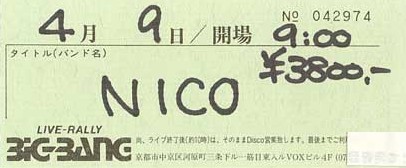 JP LP Portrait P003 1986-06-01 |
| « Details » |
This is a Velvet Underground song.
And what costume shall the poor girl wear
To all tomorrow's parties ?
A hand-me-down dress from who knows where
To all tomorrow's parties.
And what will she do and where shall she go
When midnight comes around ?
She'll turn once more to Sunday's clown
And cry behind the door.
And what costume shall the poor girl wear
To all tomorrow's parties ?
White silks and linens of yesterday's gowns
To all tomorrow's parties.
And what will she do with Thursday's rags
When Monday comes around ?
She'll turn once more to Sunday's clown
And cry behind the door.
And what costume shall the poor girl wear
To all tomorrow's parties ?
For Thursday's child is Sunday's clown
For whom none will go mourning.
A blackened shroud, a hand-me-down gown
Of rags and silks — a costume
Fit for one who sits and cries
For all tomorrow's parties.
 JP LP Portrait P003 1986-06-01 |
| « Details » |
 Recorded at The Live Inn, Shibuya, Tokyo, Japan, 1986-04-11
Recorded at The Live Inn, Shibuya, Tokyo, Japan, 1986-04-11
Recording Mobile: Studio Consultants, Inc. (SCI)
Mixed at F.R.S. by D.O.B.
Producer: Syozo "Marr" Kashiwagi
Assistant Producer: Kohichi Ando
Production co-ordinator: Caruzo Fuller
Engineer: Yuichi Sato
Staff for reissue Nico in Tokyo Femme Fatale:
JP Solid Records CDSOL-0010
Producer: Shohaku Tsuruta
Assistant Producer: Tamotsu Tominaga
Digital Re-Mastering: Kotaro Kojima (Memory-Tech)
Nico: vocals
James Young [James Edward]: piano, keyboards
Eric Random: tabla, synthesiser
Eric Graham Dowdall: percussion
Nico: vocals, Indian pump organ *
Nico: a cappella vocals **
CD Liner Notes by Pat Gilbert
In 1988, a woman in her late forties was admitted to the main hospital in Ibiza, the Mediterranean holiday island. While out cycling, she'd fallen off her push-bike and banged her head on the road. A scan was quickly done: it revealed that blood was pouring steadily from her brain. Within a few hours, the woman was dead. No one at the hospital knew who she was, but the name her companion gave seemed to ring a bell: Nico.
To any student of the 60's, Nico's rise and fall provides a remarkable apt metaphor for the failure of the counter-culture to escape its fascination with drugs and glamour, and confer upon its proponents any lasting sense of personal fulfillment.
First as a model, and then as the chic, Bohemian sophisticate who lent a decadent edge to the Velvet Underground's 1967 debut album, Nico was the girl whose beauty brought her money and attention, but little else. Yet perhaps this inner sadness was the key to her success; the reason why her sombre, Teutonic tones could infuse songs like All Tomorrow's Parties and Janitor of Lunacy with such truly bleak and crushing pathos.
According to Nico's melodramatic account of her own life, she was born plain Christa Päffgen in Cologne, Germany in 1938. While she was still a toddler, war broke out and her father was sent to the front, where shell-shock put an end to his soldiering career and, eventually, his life (Nico believed he was helped to quiet death by his Nazi doctors, though this was never proved). By the time the war ended, in 1945, Christa and her mother had moved to Berlin, and in the aftermath of defeat, tried to make ends meet as best they could. However, the young waif's talents lay in her looks and in 1953, at the age of 15, Christa left home to work as a model. Within two years, she was on the pay-roll of the famous perfume company, Coco Chanel, promoting their range of products, and by the late 50's, had moved to New York.
Having appeared in Federico Fellini's classic New Wave film, The Dolce Vita, Nico — as she now styled herself in memory of a friend's boyfriend — slipped into the Manhattan fast lane, modelling by day and hanging out with the Stones' Brian Jones and Bob Dylan by night. In 1967, art entrepreneur Andy Warhol cast her in his avant-garde movie, Chelsea Girls, before teaming her up with an art-rock garage band, the Velvet Underground, whose singer, Lou Reed, penned three special numbers for her, Femme Fatale, All Tomorrow's Parties and I'll Be Your Mirror. These songs, transformed into narcotic, unsettling canticles by her low, listless singing, became her anthems, and justified the equal billing she received on the classic Velvet Underground & Nico album.
Ever the antagonist, Lou Reed soon ejected her from the band, but she quickly found an ally in another Velvets outcast, John Cale, who produced two of the four bleak, grandiose solo albums she recorded between 1967 and 1974, and which spawned tracks like My Heart Is Empty and You Forget to Answer.
By the late 70's, however, she was washed out, a junkie losing her looks and trading on her past glories and her connections with the Velvet Underground, whose once-overlooked brilliance was now posthumously making them one of the 60's greatest achievements. When Persian heroin came flooding into England in 1980, following the Shah of Iran's fall, Nico moved to Manchester, where she began playing with a pick-up band for just one gain: drug money.
Nevertheless, her performances were still deeply moving, and once she began teasing notes from her harmonium, and breathing out her words in dark, Gothic tones, the audiences' excited cat-calls invariably quietened to a reverential hush. In Japan, where the material on this CD was recorded, her fans were evidently in awe of her legend, too, but could hardly have realized the significance of her cover of The Doors' existential masterpiece, The End. Within a year or so, the end had come for Nico. What an absurdly ungracious death for such a majestic cultural icon.
© 1996-2011
Serge Mironneau